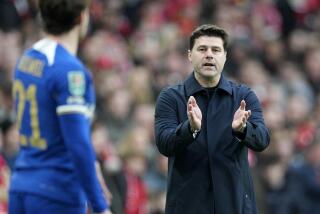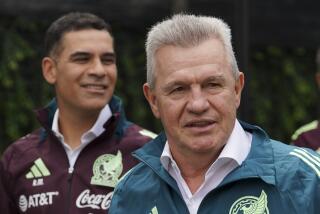Guus Hiddink is in high demand
The most wanted soccer coach in the world -- sorry, Jose Mourinho, it’s not you -- could set a record of sorts this summer by coaching no fewer than three national teams in the space of three months.
Dutchman Guus Hiddink, who led the Netherlands to the semifinals of the 1998 World Cup and South Korea to the semifinals of the 2002 tournament, apparently is considering becoming coach of Africa’s strongest team, the Ivory Coast, in time for the 2010 World Cup.
This news comes only days after Hiddink announced that he had agreed to take over as Turkey’s coach in August and only two weeks after he agreed to step down as Russia’s coach at the end of June.
The Ivory Coast is the likely standard-bearer for the continent at South Africa 2010, riding the shoulders of Chelsea striker Didier Drogba. But the Ivory Coast was knocked out of the African Nations Cup in the quarterfinals by Algeria in January and Vahid Halilhodzic last week paid the price when he was fired as coach.
Speculation immediately turned to Hiddink, especially given the good relationship he established with Drogba during Hiddink’s time as Chelsea’s interim coach last year.
“The interest from the Ivory Coast is real,” Hiddink told the Dutch newspaper De Telegraaf, “but first I have to analyze the situation. Drogba asked me in the name of the players to accept the invitation.”
Hiddink should have been coaching Russia at the World Cup, but his team fell at the final hurdle when it was beaten in a European playoff by Slovenia, one of the United States’ three first-round opponents in South Africa.
If the 63-year-old takes the Ivory Coast job, it would give him the chance to avenge a bitter loss. The Ivory Coast plays Brazil, North Korea and Portugal in the first round, and it was the Brazilians who ended the hopes of Hiddink’s Dutch team at the World Cup in France in 1998 when they won a semifinal game in Marseille, 4-2 on penalty kicks after a 1-1 tie.
Oddly enough, when he takes charge of Turkey in August with a goal of leading it to Euro 2012 in Poland and Ukraine, Hiddink will be coaching a Turkish team that beat his South Korea team out of third place at the 2002 World Cup.
Chaos for U.S. foes
All it will take for U.S. World Cup hopes to soar even higher is for some sort of scandal or controversy to hit Slovenia.
So far it hasn’t happened, but the same cannot be said about England and Algeria, the Americans’ first and third opponents
Coach Bob Bradley’s U.S. team, which plays the Netherlands in Amsterdam on Wednesday, opens the World Cup against England on June 12, and the English seem to be stumbling from one miscue to another.
This week it involved defender Wayne Bridge refusing to play for the national team because of the “untenable” situation caused by teammate John Terry’s affair with Bridge’s former partner, Vanessa Perroncel.
The animosity between the two was underlined Saturday when Bridge’s Manchester City played Terry’s Chelsea in London and Bridge pointedly ignored and refused to shake hands with Terry.
Manchester City won, 4-2, ending Chelsea’s 37-game unbeaten run at home and denting the Blues’ English Premier League title chances.
England Coach Fabio Capello, who dropped Terry as national team captain, has grown increasingly tired of the scandals surrounding his players and has spoken out, albeit mildly, telling CNN he prefers “to speak about football, not personal lives.”
England plays Egypt on Wednesday, with Galaxy and AC Milan winger David Beckham having the chance to make his 116th appearance for his country.
Algerian drama
A potentially fascinating meeting will take place in Cairo this week when a decision will be made that could have far-reaching implications for the United States.
Leaders of the Confederation of African Football (CAF) will consider what punishment to hand out to Algerian defender Nadir Belhadj and goalkeeper Faouzi Chaouchi, both of whom were tossed out of Algeria’s 4-0 loss to eventual champion Egypt in the semifinals of the African Nations Cup in Angola last month.
The U.S. plays Algeria on June 23 in its third and likely decisive World Cup first-round game in Pretoria. It is possible Belhadj and Chaouchi could be banned from the World Cup.
Belhadj was red-carded for a violent, two-footed tackle and faces a four-game ban that would likely cause him not to be picked for Algeria’s World Cup squad.
Chaouchi’s moment of madness was even worse. Angered by a penalty-kick call, he grabbed referee Bonaventure Coffi Codjia of Benin by the collar, spun him around and head-butted him during the game and later was ejected for receiving a second yellow card.
Codjia, astonishingly, did not sanction the goalkeeper for the head-butt and even failed to report the incident. As a result, he was indefinitely suspended by CAF, which now has to decide what to do about the two Algerians.
It will be interesting to see whether the African confederation has the gumption to prevent an African player from participating in the first African World Cup.
Quick passes
Ronaldo, 33, the World Cup’s all-time leading goal scorer and a World Cup winner with Brazil in 2002, announced that he would retire as a player at the end of 2011 after one final season with Corinthians in the Brazilian league. . . . Claude Makelele, 37, who helped France win the 1998 World Cup and is captain of Paris Saint-Germain in the French league, said he would retire at the end of this season. . . . Prosecutors in Mexico have charged six employees of a Mexico City bar with aiding the suspect who last month shot Paraguay World Cup striker Salvador Cabanas in the head. The six allegedly either covered up evidence, failed to give information or helped the suspect escape. The identified suspect is still being sought. . . . Nigeria on Saturday appointed former Sweden coach Lars Lagerback as its coach for the 2010 World Cup.
More to Read
Go beyond the scoreboard
Get the latest on L.A.'s teams in the daily Sports Report newsletter.
You may occasionally receive promotional content from the Los Angeles Times.










